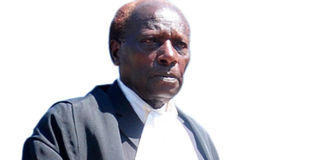Truth about defunct National Bank of Commerce – Part II

Retired Supreme Court Justice, George William Kanyeihamba. FILE PHOTO
In Part I, we discussed the aims and objectives of Kigezi Bank of Commerce (KBC), revealing that it was founded solely for enlightening the indigenous people of Kigezi sub-region with the major purpose of teaching them the culture of banking and saving money for their own advancement and development.
The constitution of KBC strictly prohibited non-Kigezians from owning its shares or being its directors. Non-Kigezians could only be lenders or creditors to the bank.
In this part, we reveal how the aims, objectives and constitution of KBC were scuttled by a few shareholders with powerful positions in and connections with government and the establishment of Uganda.
The tiny minority used their positions in the NRM to convert KBC into National Bank of Commerce (NBC) and abandon the founders’ aims and objectives.
One of the directors, accompanied by one or two of his associates travelled to Nairobi and persuaded three Kenyans who owned a private commercial bank and attempted to convince them to invest in KBC.
Apparently, they told him that they were not interested in investing, but acquiring and owning a commercial bank in Uganda. The director agreed, but both parties knowing the repercussions and provisions of Ugandan laws, agreed on a compromise which itself they knew was illegal in Uganda.
The plan was as follows; the three Kenyans would own KBC but it would be named National Bank of Commerce open to aliens to buy and own its shares or sell as they wish globally. The preferential shares owned by Kigezians for the bank’s protection were found to be an impediment to the Kenyans. They insisted that they should be abolished.
KBC directors and shareholders were not consulted in any legally convened meetings. The chairpersons of Kigezi districts, councils and counties who owned shares in KBC were not consulted or notified of a subsequent so-called general meeting.
Majority of the 11 directors elected at the inaugural meeting of KBC were never invited to the meeting which adopted the decisions of the Kenyans and the said director. That is how the director became the Kenyan’s subordinate and a messenger.
The director organised a secret meeting and selected who among the shareholders and directors should attend it. He carefully omitted to call most of the directors and shareholders who were knowledgeable about the bank and invited instead those who agreed with him or were not aware of the Nairobi illegalities.
Next he picked peasant shareholders from Kabale Municipality promising them that they would become rich if they attended the secret meeting which was at the venue described as a general meeting.
At that illegal meeting, every change the Kenyans demanded was approved. The bank’s headquarters were transferred to Kampala. KBC became NBC.
Later, he called a few selected shareholders and informed them that the new Kenyan owners of the bank had insisted that only Mr Amos Nzeyi, Mr Amama Mbabazi, Dr Ruhakana Rugunda and Prof Ezra Suruma were acceptable and had been appointed to remain on the board.
The reasons for their preference became obvious to everyone as we shall narrate in the final part of this story.
Prof Kanyeihamba is a retired Supreme Court judge.
[email protected]




